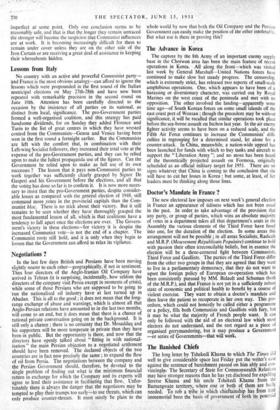Negotiations ?
In the last few days British and Persians have been moving slightly nearer to each other—geographically, if not in sentiment. Thus four directors of the Anglo-Iranian Oil Company have arrived in Tehran (it is surprising, incidentally, how seldom the directors of the company visit Persia except in moments of crisis), while some of those Persians who are supposed to be going to -tun the nationalised oil industry have at last turned up in Abadan. This is all to the good ; it does not mean that the long- range exchange of abuse and warnings, which is almost all that Anglo-Persian relations have amounted to in the last two months, will come to an end, but it does mean that there is a chance of rational private conversation going on in the background. It is still only a chance ; there is no certainty that Dr. Mosaddaq and his supporters will be more temperate in private than they have been in public. But the opportunity is there, and now that the directors have openly talked about " fitting in with national- isation " the main Persian objection to a negotiated settlement should have been removed. The declared objects of the two countries are in fact now precisely the same ; to expand the flow of oil from Persia. The negotiations between the company and the Persian Government should, therefore, be devoted to the single problem of finding out what is the minimum financial return in exchange for which the Company and its experts will agree to lend their assistance in facilitating that flow.. Unfor- tunately there is always the danger that the negotiators may be tempted to play their trumps too earlyL-to use threats, which can only produce counter-threats. It must surely be plain to the whole world by now that both the Oil Company and the Per,I.la Government can easily make the position of the other intolerable. But what use is there in proving this?


































 Previous page
Previous page